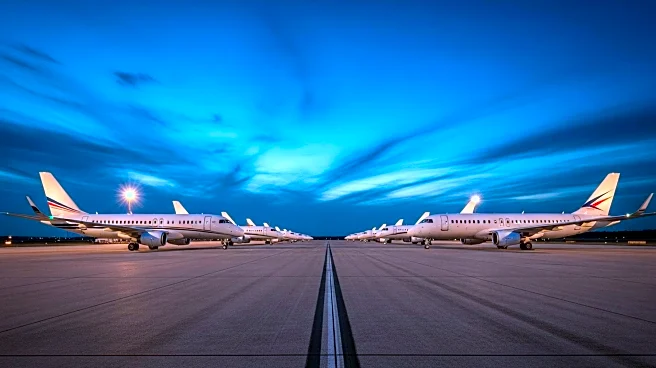What's Happening?
Ryanair Group CEO Michael O’Leary has announced significant fleet adjustments across the airline's network in response to changing market conditions, including increased taxes and fees, as well as geopolitical issues. In Spain, Ryanair plans to cut two million seats from regional airports for the winter due to a 6.2% increase in fees by airport operator AENA. These seats will be redistributed to locations like Barcelona, Madrid, Italy, and Portugal, where costs are lower and growth potential is higher. Additionally, Ryanair is reducing its fleet in Austria from 19 to 16 aircraft, citing a €12 aviation tax per passenger as a crisis point. The airline is also facing disruptions in Poland due to drone activity and has had operational challenges in Israel, leading to a reconsideration of its presence there.
Why It's Important?
These fleet adjustments reflect Ryanair's strategic response to economic pressures and geopolitical tensions, which are impacting the airline industry globally. By reallocating resources to more cost-effective regions, Ryanair aims to maintain profitability and growth. The decision to reduce operations in Austria and Spain highlights the impact of local tax policies on airline strategies. Furthermore, the temporary closure of airspace in Poland due to drone activity underscores the growing concern over drone-related disruptions in aviation. Ryanair's challenges in Israel illustrate the complexities of operating in regions with fluctuating regulatory environments, which can affect international airline operations and market access.
What's Next?
Ryanair plans to continue adjusting its operations based on market conditions, with potential expansions in regions like Jordan and considerations for markets such as Egypt, Tunisia, and Algeria, pending regulatory changes. The airline is closely monitoring the situation in Ukraine, with expectations that the airspace may remain closed for several years unless conditions improve. Ryanair's strategic focus will likely remain on optimizing its network to navigate economic and geopolitical challenges, while exploring new opportunities in deregulated markets.
Beyond the Headlines
The adjustments made by Ryanair highlight broader industry trends, including the impact of environmental taxes and geopolitical tensions on airline operations. The airline's focus on cost reduction and strategic reallocations may influence other carriers facing similar challenges. Additionally, the rise of drone activity presents a new dimension of risk management for airlines, potentially leading to increased regulatory scrutiny and technological investments to mitigate disruptions.











